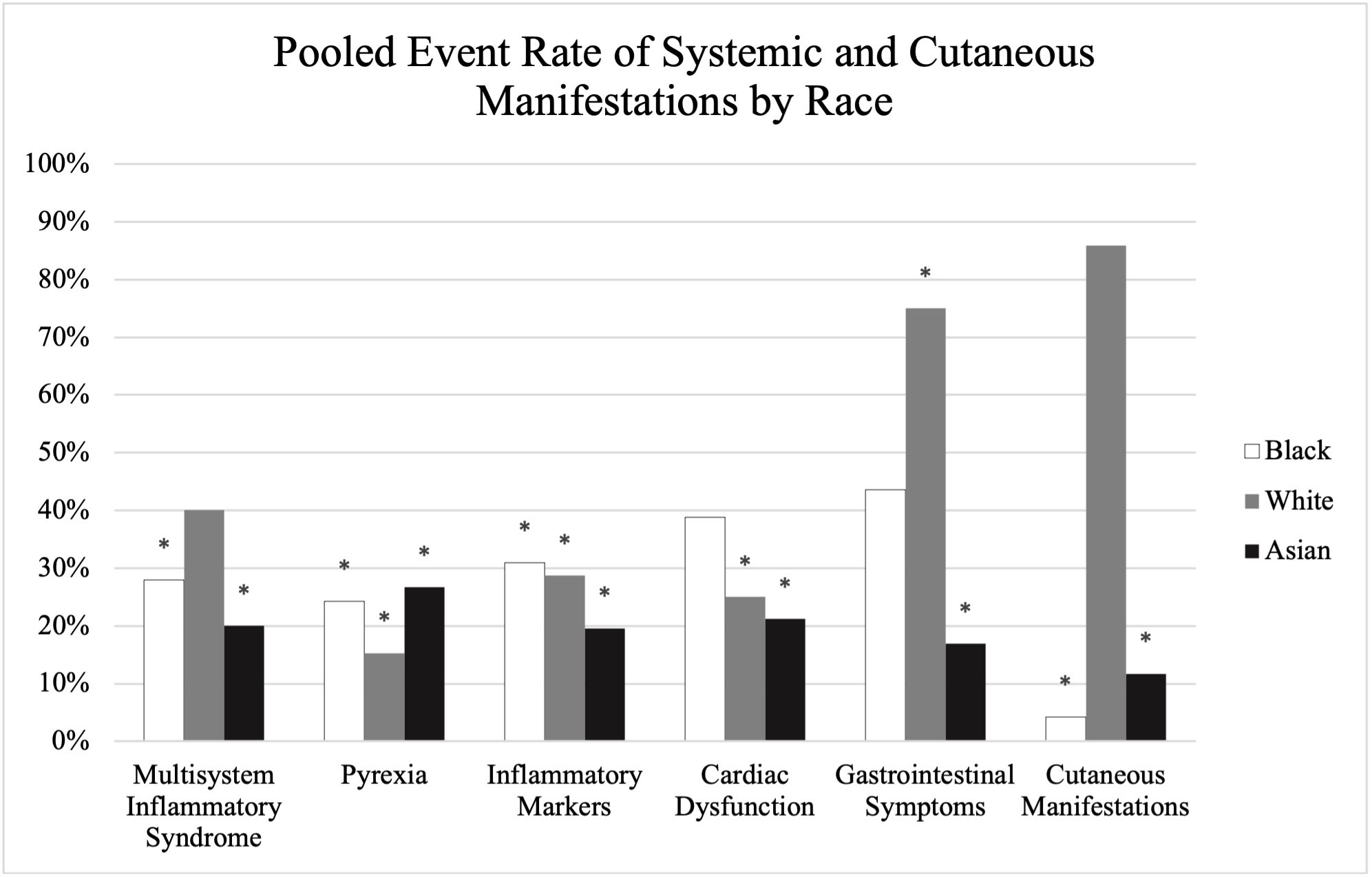Session Information
Session Type: Poster Session D
Session Time: 1:00PM-3:00PM
Background/Purpose: Although various systemic and dermatologic manifestations associated with COVID-19 have been reported in the literature, investigations of how these manifestations vary by race remain limited. The aim of this systematic review and meta-analysis is to investigate the epidemiology of systemic and dermatologic manifestations among different races.
Methods: A search for studies on dermatologic and systemic manifestations associated with COVID-19 that were published prior to February 28, 2022, was run on PubMed and Embase in February 2022. Case series and observational studies were included. Race (Asian, Black, White, American Indian, or Alaska Native, and Native Hawaiian or other Pacific Islander), and the most common systemic and dermatologic manifestations were extracted. Event rates for each outcome by race were pooled using a single-arm meta-analysis and the random-effects model to account for heterogeneity.
Results: Nineteen studies were selected for meta-analysis, representing a total number of 2,946 cases. Pooled estimates for MIS for Black, White, and Asian cases were 28% (95% CI, 18.8-40.7, p=0.001), 40.1% (95% CI, 23.0-60.1, p=0.332), and 20% (95% CI, 13.2-29.2, p=0.000), respectively. The most common manifestations reported were pyrexia, elevated inflammatory markers, cardiac dysfunction, and gastrointestinal symptoms. The frequency of elevated inflammatory markers within Black cases surpassed White and Asian cases (30.9%, 28.7%, and 19.6%, respectively). Similarly, for cardiac dysfunction, Black cases also exceeded White and Asian cases (38.8%, 25%, 21.2%, respectively). The frequency of pyrexia reported among Asian and Black cases was similar, exceeding White cases (26.7%, 24.3%, and 15.3%, respectively). The prevalence of dermatologic manifestations in Black cases was only 4.2% (95% CI, 0.8-19.8, p=0.000) compared to White and Asian cases, 70.7% (95% CI, 42.9-88.6, p=0.139) and 11.7% (95% CI, 9.0-15.1, p=0.000), respectively.
Conclusion: This meta-analysis and systematic review highlights the discordance in papers published for COVID-19 systemic manifestations compared to dermatologic manifestations among different races. There is a large difference in reported Black cases of cutaneous lesions compared to White and Asian cases. However, this does not hold true in systemic manifestations. Further investigation is needed to determine whether the prevalence of cutaneous manifestations reported in the literature is accurate. If this prevalence is a result of the difficulty identifying and reporting lesions, Black patients may suffer from delayed care of treatment.
To cite this abstract in AMA style:
El-Said A, Ahmad A, Valenti M, Shah N, Soto S, Beg S. COVID-19 Cutaneous and Systemic Manifestations Among Race: A Systematic Review and Meta-Analysis [abstract]. Arthritis Rheumatol. 2022; 74 (suppl 9). https://acrabstracts.org/abstract/covid-19-cutaneous-and-systemic-manifestations-among-race-a-systematic-review-and-meta-analysis/. Accessed .« Back to ACR Convergence 2022
ACR Meeting Abstracts - https://acrabstracts.org/abstract/covid-19-cutaneous-and-systemic-manifestations-among-race-a-systematic-review-and-meta-analysis/

